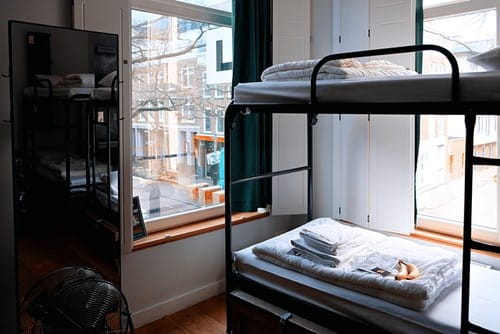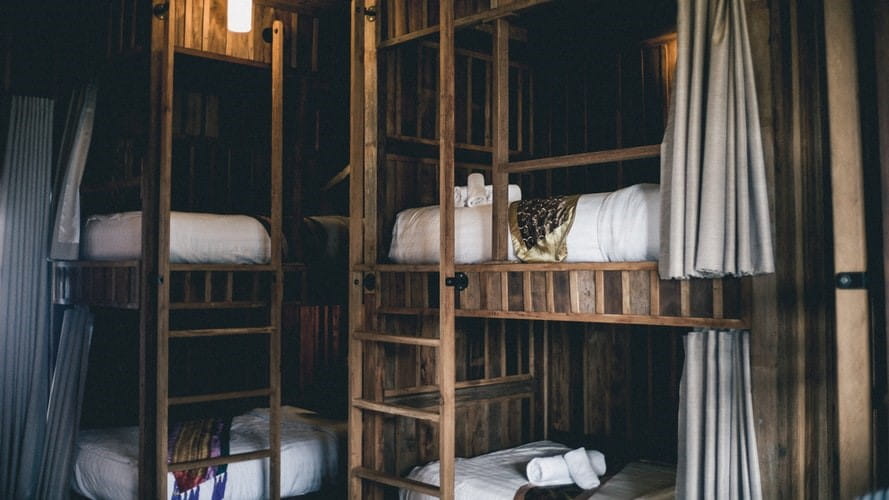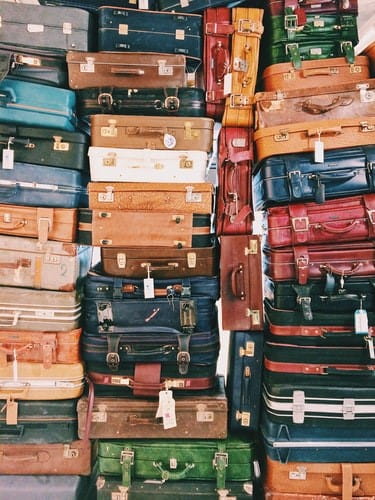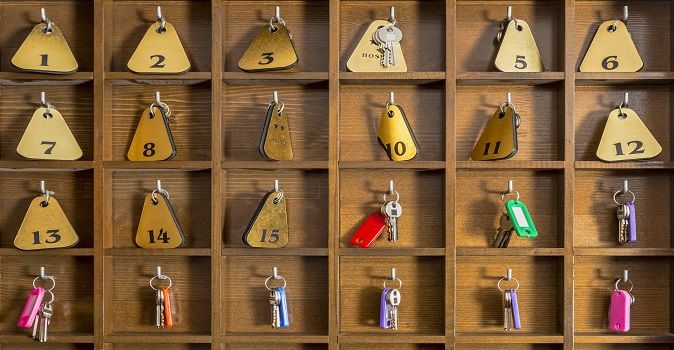You came across hostels in your search for a cheaper alternative to hotels or Airbnbs, but you need more information before you take the plunge and book your stay. You've come to the right place.
In this blog, you'll discover why hostels are one of the most affordable accommodation options for international travelers. They're quickly gaining popularity—especially among millennial travelers—due to their low cost and unique shared-space environment.
If you're more acquainted with hotels, you might need a few pointers before your first stay in a hostel. Explore this comprehensive guide for everything you need to know before booking a hostel so you can make the most out of your experience.
What is a Hostel?
Experienced travelers describe hostels as a "budget-friendly type of accommodation that focuses on a shared social experience." Travelers pay for a bed and a shared space, making the accommodation much more affordable than a standard hotel room.
Hostels vs Hotels
Hostels feature dorm-like spaces for sleeping, often with bunk beds. Each visitor is provided a bed and a space to store their personal items. The rest of the space is shared, including the bathrooms, showers, kitchen area, and common area for mingling with others.
Hostels typically don't provide amenities such as turndown service, laundered towels, and room service like hotels due to the lower price point. One or two staff members at the hostel serve as information resources and community building event coordinators.

A Sense of Community
Hostels allow you to meet new people from all over the world through community-focused accommodations. They're popular among millennial travelers, and even more so among solo travelers looking to experience community in other parts of the world.
The common area, shared cooking/eating space, and planned social events provide opportunities for travelers to establish friendships and find travel companions in a foreign place. This aspect is a major reason why some travelers opt for this type of accommodation.
Who Stays in Hostels?
The majority of hostel guests are money-conscious solo travelers, backpackers, and students typically under the age of 35. However, hostels are for everyone. When staying in a hostel for the first time, expect to meet many kinds of people from all around the world who can provide priceless travel insight and advice.
Hostels are also a perfect option for travelers who plan to spend very little time in their room and more time out exploring. Whether gap year travelers or digital nomads, hostel-goers come from all different walks of life, open to the simple, no-frills accommodation hostels have to offer.
If no-frills travel isn't quite your style, you can even spend the night in a luxurious, boutique-style hostel. Boutique hostels offer a smaller property and a more intimate ambiance—often with a unique design theme.
But beware: the hostel aficionados over at Hostel Geeks warn that some hostels market themselves as boutiques even when they're not. That's why it's so important to read online reviews and talk to other travelers before you book.

How Much Do Hostels Cost?
Hostels vary in price, but they typically range from $10/night to $60/night. This range can depend on several factors, such as:
- Location (big Western European cities are often pricier than Eastern European cities)
- Room size (more people in a room often reduces the price)
- Amenities
- Local competition from other hostels
- Available space (booking ahead is often cheaper than walking in)
- Duration of stay
PRO TIP: Don't forget to download our "Ultimate Guide to Budget Travel." This 27-page guide includes money-saving tips for accommodations, transportation, and activities as you travel abroad.
Pros and Cons of Hostels
It's important to consider the pros and cons of staying in a hostel so you know what you're walking into before you book. Hostel-staying isn't for everyone, mostly due to the dorm-style sleeping arrangement and minimal amenities.
Pros
- Inexpensive prices
- Social opportunity
- Prime locations (like Barcelona, Amsterdam, London, and Paris are ideal locations to book a hostel right in the epicenter)
- Group accommodation (share one large room for your entire group)
- Authenticity (enjoy a locally sourced breakfast and homey interactions with staff and guests)
Cons
- Lack of privacy (don't plan on finding much alone time in a hostel with shared sleeping quarters)
- Risk of theft (we cover safety tips below)
- Fewer amenities

Choosing Your Hostel
Booking vs Walking In
When planning to stay at a hostel, you can either book your bed beforehand or walk right in and ask if there is available space.
Walking in can be convenient for freestyle travelers who don't like to plan too far ahead. Travelers who plan to stay in a city for several days may also benefit from walking in, as the hostel may allow you to negotiate a lower rate for an extended duration.
However, walk-in prices are often higher, and you aren't guaranteed a space. You also won't have the opportunity to read reviews or vet the hostel before staying.
That's why booking ahead is typically your best bet for ensuring a comfortable stay. Book through trusted websites like Hostelworld.com or Hostels.com so you know you're booking somewhere legitimate.
Hostel Room Types
Hostels frequently offer unisex dorms, with layouts featuring anywhere from 4 to 40 bunk beds. The 4-bed dorm is the most common hostel room type.
Prices are higher for private rooms or smaller rooms with fewer people, but they can be a better option for those who are uncomfortable sleeping next to too many people.
Female-only dorms are very common at hostels and can provide a more comfortable setting for women who are concerned about their safety.
Other common hostel layout types include:
- Dorms Without Bunk Beds - Classier hostels may provide isolated beds within a dorm room. This adds a bit more space between occupants and can relieve your fear of being woken in the middle of the night by a moving bunkmate.
- Pod-Styled Dorms - A more private option are the pod-styled dorms, which are becoming trendier around the world. These provide a bit more privacy, including personal power sockets and a curtain to close at night.
- Private Rooms – These rooms come with a single twin bed, two twin beds, or a double/king size bed for the most private experience.
- Family Room – Some hostels provide family-style private rooms that can accommodate multiple family members in one room.
- Apartment Style – These studio-apartment-style rooms are similar to Airbnbs since you rent out an entire apartment space. They are ideal for those wanting private kitchen amenities in addition to a private bathroom and sleeping area.
- Suite-Style – This is a top-of-the-line hostel layout. Suite-style hostels provide a larger space with various amenities and sometimes feature two levels.
Not all hostels provide the more luxury-style accommodations, but most will at least offer dorm-style and private rooms.
Hostel Amenities
Hostel amenities aren't usually as abundant as hotels, but just enough is provided for a comfortable stay. (What hostels lack in amenities they make up for in social opportunities, anyway!)
Most hostels will provide the following amenities:
- Personal locker for storing items (though you may need your own lock)
- Shared common area, bathrooms, and showers
- Free Wi-Fi
- Washing machines to stay on top of laundry (some are coin operated, some are free, and some require you to pre-pay at the front desk)
- Locally sourced breakfast/dinner
- Organized social events (social nights, day trips to nearby cities, pub crawls, etc.)

Things to Take to a Hostel
It's important to bring along a few necessities to ensure a smooth and easy stay.
- A lock is necessary to keep your personal items secure in the locker provided.
- Earplugs or headphones are helpful to light sleepers in case of noisy late-night stragglers or early morning risers.
- Eye masks can also be beneficial in case your neighbors decide to switch on the lights during the night or early morning.
- A long extension cord may be necessary so you can reach the nearest outlet and charge your electronics at night–—especially if you're on the top bunk.
- You may need an adapter, depending on where you're traveling.
- Toiletries won't be provided like at most hotels, so make sure to bring essentials including soap, shampoo, toothpaste, etc.
- Shower shoes are a must for the shared bathroom.
- A towel is important too. (Some hostels provided towels, but the last thing you want is to be stranded without one.)
Are Hostels Safe?
As a first-time hostel-goer, you might have concerns about your safety and the safety of your belongings. Hostels are generally safe accommodations, but it's important to do your research before deciding where to stay. And there is no shame in picking up and leaving if you don't have a good feeling about the place.
Your instinct can be incredibly helpful in determining whether a hostel is a good fit for you or not, so don't disregard it. For these instances, it's helpful to have a backup fund for unexpected costs in case your only alternative is a pricier hotel.
Safety Tips
Follow these safety tips to help you feel more comfortable at night:
- Read customer reviews before booking to ensure the quality of the hostel and its security policies are up to your standards. You can read hostel reviews from bloggers like"The Hostel Girl"or on"HostelWorld.com, which offers user-generated ratings for each hostel it lists."
- Find a hostel in a central location. These tend to be safer because of their proximity to transportation, grocery stores, sites you wish to see, etc.
- Choose a room with fewer beds (or even a private room) to reduce your chances of falling victim to theft.
- Keep valuables in your pillowcase, if not in the provided locker. (Make sure to bring a lock with you!)
- Take your items with you during the day.
- Walk away if it doesn't feel right.

How to Make the Most Out of Your Stay
Make sure you take advantage of the opportunities hostels have to offer in addition to ensuring a comfortable stay.
Meet the Staff
It's common for hostel staff to be current or recent travelers who are overflowing with knowledge about the local area. You'll likely experience an open dialogue with these staff members and a sense of welcoming that far exceeds what you'd experience at a hotel.
Hostel staff know the true benefits of hosteling and want their guests to make the most of it too, so hosting social events and getting to know their guests is common practice.
Mingle with Other Guests
One experienced traveler explained that "the opportunity to meet extraordinary people" is the reason I will always choose a hostel.
Hostels attract open-minded people who are interested in getting to know their fellow travelers. Hostels often lead to unexpected, lifelong friendships and unique experiences with people from all around the world.
Ask around to learn what activities your fellow hostel-goers have planned for the day or ask if anyone would like to join you on a group trip somewhere nearby. Many will be open to the opportunity and happy to have someone new to spend the day with.
Make sure to participate in hosted events for an easy way to fill up your day surrounded by others.
Try the Food
Many hostels provide a complimentary breakfast, while others offer breakfast for a small fee. Sitting down for a meal can be a great opportunity to chat with other travelers and explore local foods, since meals are often influenced by the local culture. This element can add to the authentic experience hostels have to offer.
Breakfast is also a good time to find out where everyone is headed for the day and find out whether you can tag along.
Hostels that don't provide often feature a shared kitchen space where you can interact with other guests and peek at the foods people from around the world are eating.
Final Thoughts
Whether you're traveling the streets of Sweden or South Korea, hostels offer a unique experience by fostering community between individuals from foreign places.
Plus, their affordability allows you to splurge on a longer and more immersive experience in your destination country as you get to know the cities through a local's lens. You'll also make friends along the way from countries all over the world. If this sounds like your kind of traveling experience, book your hostel now!



